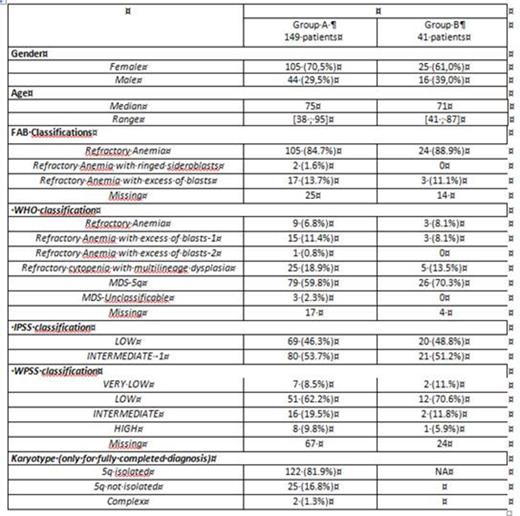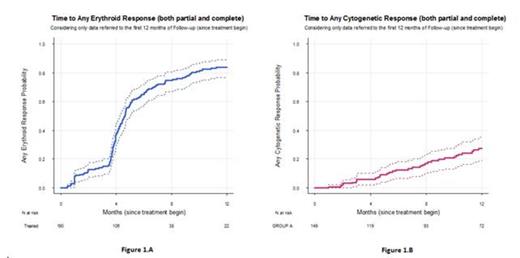Abstract
In Italy the use of lenalidomide (LEN) in MDS with del(5q) is ruled by a national agency (AIFA, Agenzia Italiana del Farmaco) Registry since 2008. We conducted an observational, non-interventional, multi-centre, retrospective/prospective cohort study, registered as MORE (ClinicalTrials.gov NCT01347944), to investigate the use LEN in the context of a "real world setting".
Registry eligibility: IPSS low or intermediate-1 risk MDS with transfusion-dependent anemia and 5q31 deletion. MORE integration: retrospective collection of clinical, hematological and cytogenetic data at pre-registry time, at enrollment, after 4-6 cycles and 8-12 cycles of LEN, and at the last available follow-up and/or end of treatment. Hematological and cytogenetic response was assessed according to Cheson et al (Blood 2006). Statistical analysis used PL / SQL Developer and R open source software.
190 patients (M:F 60: 130) were included in this study (Table 1). GROUP A, (149 patients, median age 75 years) with complete data sets, and GROUP B (41 patients, median age 71 years), investigated only by FISH were analyzed separately. By integration of Registry with MORE forms, including disease history and/or treatment preceding inclusion in the Registry, information was recruited over a median time of 44 months (range 0.5-237).
The complete erythroid response rate was 74.6% in group A and 78.6% in group B after 4-6 cycles treatment, and 85.8% and 88.9%, respectively after 8-12 cycles. The partial response rate was 11.5% in group A and 10.7% in group B at 4-6 months cycles.
The complete cytogenetic response rate (only group A ) after 4-6 cycles was 7.8%. The partial response rate was 2.3 %. After 8-12 cycles complete response increased to 13% , partial response to 9.6 %.
Leukemic evolution was observed in 18 cases (9.5%). Disease progression to a higher risk MDS was found in 12 cases (6.3%).
Neutropenia (grade 3-4; 59%) and thrombocytopenia (grade 3-4; 21%) were predominant in the first 6 months of treatment. Infections (21%) mostly affected the upper respiratory tract.
As far as we know this is the first report on LEN administration within a national registry. Despite being a retrospective study solid information on real life management of del(5q)-MDS were obtained. The known efficacy on erythropoiesis was strongly confirmed (FIG.1A). Notably, we also found a good response in low/int-1 IPSS cases with non-isolated 5q- (70.6%), suggesting that IPSS score plays a role in the successful response. The low rate of cytogenetic response possibly reflected the high level of variations in timing and dosage of LEN as well as heterogeneity of analyses in a non-centralized study. Nevertheless, results after 8-12 cycles (22.6%; FIG.1B) were similar to the 25% found with 5mg LEN in the European cooperative MDS004 study (Fenaux P et al, Blood 2011).
AML evolution was found in 18/190 cases (9.6%) after a median of 7.5 LEN cycles (range 1-30). Moreover twelve additional cases (6.3%) showed progression to RAEB1 or RAEB2 after a median of 19.5 LEN cycles (range 4-56). In the MDS004 study a similar analysis gave 25.4 % of leukemic evolution and 2.9% of disease progression.
This large series of MDS with del(5q) allowed us to confirm the efficacy of LEN in a "real world setting". Biological and clinical features seem to be critical for the success of this personalized therapy.
Roncadori:Celgene: Research Funding. Rossi:Celgene: Research Funding. D'Emilio:Celgene: Research Funding. Di Renzo:Celgene: Research Funding. Leoni:Celgene: Research Funding. Rambaldi:Roche: Honoraria; Novartis: Honoraria; Amgen: Honoraria; Celgene: Research Funding; Pierre Fabre: Honoraria. Avanzini:Celgene: Research Funding. Visani:Celgene: Research Funding. Tura:Celgene: Research Funding. Covezzoli:Celgene: Research Funding. Mecucci:Celgene: Research Funding.
Author notes
Asterisk with author names denotes non-ASH members.



This feature is available to Subscribers Only
Sign In or Create an Account Close Modal